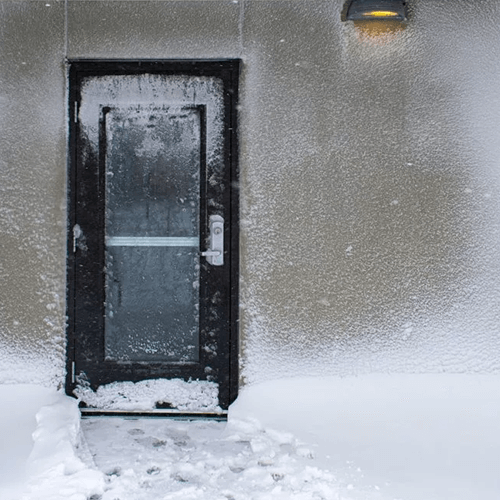
The door to your commercial business creates a lasting first impression for any visitor — it's the first thing they see and touch as they enter your building. That’s why it’s critical to choose the best door for your entrance to protect against the effects of temperature change.
Whether you go with a steel, wood, or fiberglass door, the temperature will affect it somehow. As slight changes occur, the door may have problems opening or even refuse to open at all. Your hardware may have trouble latching, and the door can become misaligned.
To know which commercial door material best suits your business, you must understand how different materials are affected by temperature.
Commercial doors are specifically designed for business purposes. You can find these types of doors in the following buildings and facilities:
Commercial doors are fabricated to be extra durable and withstand temperature changes.
Commercial doors can shrink or warp when there are sudden changes in weather and humidity. These changes lead to functional and cosmetic issues.
Steel contracts in cold temperatures. Any part of your steel commercial door can freeze up if not regularly moved, including the springs and hinges. For this reason, lubrication is essential in the winter.
Metal doors aren't necessarily the best in the heat, either. The material captures and stores heat, making it hot to the touch. This can become painful for your customers as they enter your building and possibly deter them from coming in.
Fiberglass isn't very susceptible to temperature changes, so it won't expand and contract as much as other materials. Because of this, it won't need repainting or staining as often. Fiberglass doors contain a foam core that can make your building more energy-efficient.
You may notice condensation inside your full glass doors as temperatures drop. This is actually a good thing, as it means your doors are energy-efficient and doing what they're meant to do. Condensation forms because humid or warm air can't escape your property. You can reduce it by installing a humidifier.
Heat causes many materials to expand, and wood is no exception. Commercial entryways are frequently exposed to high heat and humidity in the summer. Not only does this exposure lead to expansion and warping, but it causes the doors to absorb moisture. As a result, your entrance door may swell, making it hard to open and close.
While heat causes wooden doors to expand, cold causes them to shrink. The colder months tend to have less humidity, so the air doesn't retain as much moisture.
However, as your door contracts, it creates space between the floor and the frame. This gap may allow a cold draft to enter your business, making your customers or employees uncomfortable.
Along with the door material itself, the hardware also goes through changes. During the warmer months, the locks on your commercial door may jam. Because the door expands, the locks may become harder to turn or get stuck in one position.
Most business owners experience more lock problems during the winter months. The door and frame contract as temperatures drop, making the lock and door fit together improperly. This result is more common for wood doors and door frames.
You can’t do much to stop your door from expanding or contracting, but there are some steps you can take to protect your business from the adverse effects of this reaction.
You can place weatherstripping around the door to seal gaps that could allow a cold draft to come in. These strips also help keep cooled air in your building during the summer.
Using a humidifier in your commercial property will help minimize the effect of temperature changes on your doors by maintaining optimal moisture levels. This kind of regulation prevents extreme expansion and contraction.
Regular maintenance and inspections are crucial to the health of your commercial doors. Talk to your installation contractor about the best maintenance routine to keep your doors in tip-top shape.
If you have a door that’s been damaged due to constant temperature changes, contact CDF distributors to ask about our commercial door replacements!